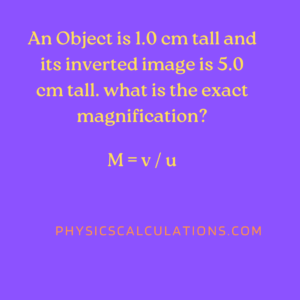Question
An Object is 1.0 cm tall and its inverted image is 5.0 cm tall. what is the exact magnification?

Video Solution to “An Object is 1.0 cm tall and its inverted image is 5.0 cm tall. what is the exact magnification?”
Text Solution to “An Object is 1.0 cm tall and its inverted image is 5.0 cm tall. what is the exact magnification?”
Data
To find the exact magnification of the object, we will need to extract our data from the question
Height of an Image that is not inverted will be, v = 5.0 cm
But when a height of an image is inverted, the value will become negative.
Therefore, the height of the Image, v = – 5.0 cm
Object’s height, u = 1.0 cm
Unknown
Magnification, M = ?
Formula
To apply the right formula, we need to remember that magnification is the ratio of the height of the image to the height of the object.
Therefore, we can write the above definition in mathematical form as
Magnification, M = Height of the image (v) / Height of the object (u)
Therefore, the formula that can help us solve the problem is
M = v / u
Solution
We will now put our data into the above formula
Magnification, M = v / u = – 5 / 1 = – 5
Therefore, the exact magnification of the image is negative five (-5).
However, when the magnification is negative, it shows that the mirror is inverted and real. Thus, the lens of the mirror can be classified as a concave mirror.
More Problems on Magnification
Here are more examples to give you a clear understanding of how to solve problems on magnification;
Problem 1
An object 5 centimeters high is placed at a distance of 12 centimeters from a convex lens of a focal length of 8 centimeters. Calculate the position, size, and nature of the image.
Solution
| Real is positive | New cartesian |
| f = +8 cm u = +12 cm Using (1/v) + (1/u)=(1/f) (1/v)=(1/f)-(1/u) (1/v)=(1/8)-(1/12)=1/24 v=24cm (real image) M=(v/u)=(24/12)=2 Also, M=(h/5) 2=h/5 h=10 | f = +8 cm u = -12 cm (object left of lens) Using (1/v)-(1/u)=(1/f) (1/v)=(1/f)+(1/u) (1/v)=(1/8)+(1/-12)=1/24 v = 24 cm (on the right real image) |
From the solution in the table above, the image is inverted, magnified, and real 24 centimeters away from the lens which is facing the object. Additionally, the image’s height is 10 centimeters.
Problem 2
An object placed 5 centimeters in front of a converging lens of a focal length of 10 centimeters produces a magnified image 8 centimeters high. Find the size and position of the image.
Data
Focal length, f = 10 cm
Object’s height, u = 5 cm
magnified image height = 8 cm
Unknown
Height of the image, v = ?
Magnification, M = ?
height of the object, h = ?
Formula
First formula to find the height of the image, v = ?
(1/v) + (1/u) = (1/f)
Second formula to find the magnification
M = v / u
Third Formula to find the object’s height, h
M = magnified image height / h
Solution
We will apply our first formula (1/v) + (1/u) = (1/f) to find v
(1/v) = (1/10) – (1/5) = – 1 / 10
v = – 10 cm
Which shows that the image is virtual,
Hence, by applying the second formula, M = v / u = 10 / 5 = 2
Thus, we can now proceed to the third formula,
M = magnified image height / h
Which implies that
2 = 8 / h
and h = 8 / 2 = 4 cm
Read:
A missile is flying at a speed of 125 m/s